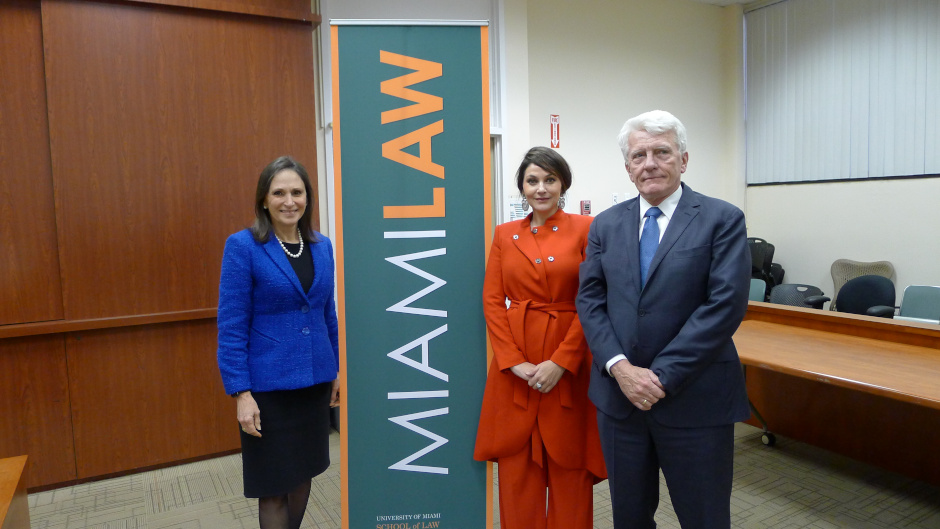Amidst the news of the crises in around the globe, such as the humanitarian and political issues in Venezuela, Miami Law’s International Arbitration Institute hosted its fifth annual White & Case International Arbitration Lecture last month. The topic concerned new perspectives on international State responsibility for their complicity in internationally wrongful acts of other States.
Director of the institute, Marike Paulsson, a torchbearer of innovation and experience in the realm of international arbitration, introduced Carolyn Lamm, J.D. ’73, a partner and litigator at White & Case LLP and an adjunct faculty member of the White & Case International Arbitration LL.M. Program.
Lamm, in turn, introduced the Institute’s faculty chair and holder of the distinguished Michael Klein chair, Jan Paulsson, the evening's speaker.
In the lecture, Paulsson quoted Lord Palmerston: “States have no friends, only interests,” a message that has been reiterated by statesmen like Henry Kissinger and Charles DeGaulle, to transition to the International Law Commission’s Articles on State Responsibility. In particular, he referred the audience to Article 16, detailing the responsibility of a State that was complicit in “aiding and assisting” another State in the commission of an internationally wrongful act.
Meant primarily for the progressive development of international law, the ASR has greatly expanded the theory of international state responsibility and have been generally well-received by the global community. When the International Court of Justice cited the ASR in its historic and contentious 2007 Bosnia and Herzegovina v. Serbia and Montenegro decision, however, it became clear that Article 16 had gone beyond the boundaries of progressive development.
Regarding the ICTY judgment in favor of the Bosnian Serbs, Paulsson quoted the Late Antonio Cassese’s determination of the decision as a “judicial massacre,” and continued his analysis by questioning whether inaction amounted to complicity under Article 16. What does amount to conspiracy? How much support needs to be given? How much knowledge does a State have to have of the internationally wrongful act? Does the decision to act (or not to act) have to be a joint decision between the States?
Paulsson piqued the audience’s interest and dove deeper into the topic. He said that the world has come up with over two dozen definitions for the term “abusive of rights,” resulting in inconsistency and the inability to apply a uniform definition around the world. He criticized judgments and legislation for not suggesting that the expression was not necessary; complicity should be sanctioned merely because it was wrong.
To demonstrate how far the development of responsibility of States for internationally wrongful acts has come, Paulsson elucidated the facts that led to the award rendered in favor of Chevron in the Chevron v. Ecuador case in August of 2018.
The implications for state responsibility in the case may make the award groundbreaking. In addition to holding the court judgment of $8.6 billion against Chevron to have been a fraudulent denial of justice, the arbitrators held that Ecuador must inform any State, including its courts, of the award, thus putting them on notice for “knowledge” of the establish unlawfulness under Article 16. The notice fulfilled a crucial requirement of Article 16, making it undeniably difficult for other States to be willing to enforce the judgment lest they are complicit in an unlawful act.
Questions from students in the White & Case International Arbitration LL.M. Program and practitioners who attended the lecture followed. Lamm offered concluding remarks and the attendees retired to a cocktail reception in the Alma Jennings Foundation Student Lounge.
More on Miami Law’s International Arbitration Institute
More on Miami Law’s LL.M. in International Arbitration

